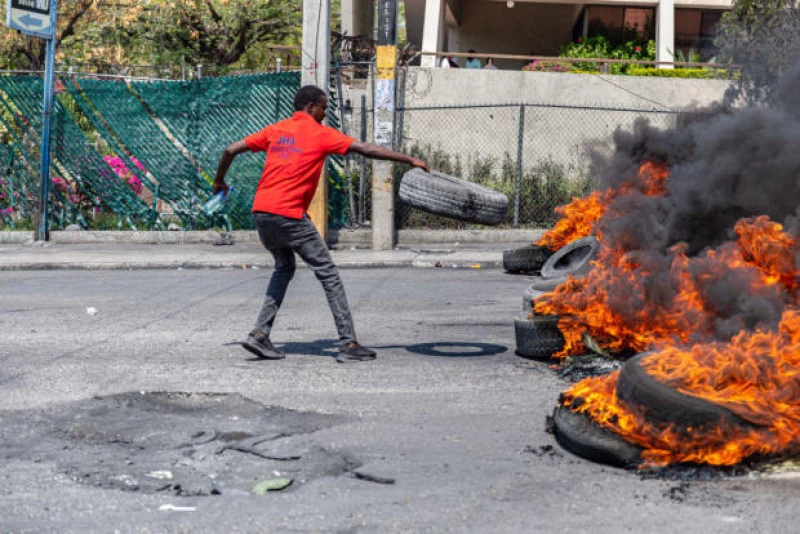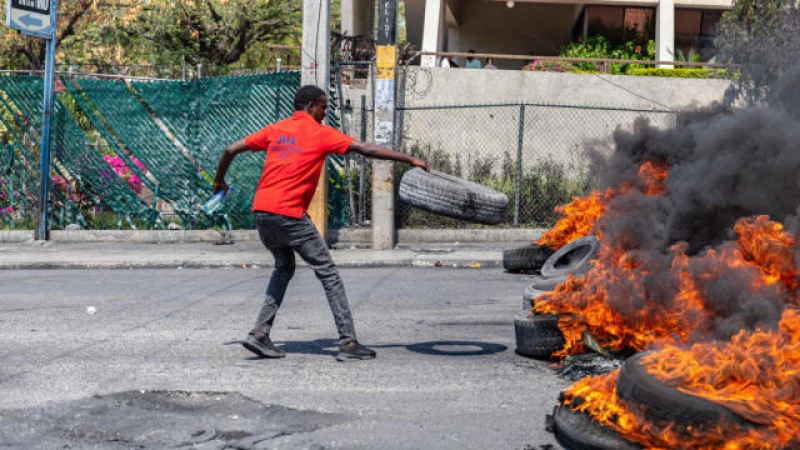Despite the recent increase in violence and political turmoil in Haiti, the U.S. has not yet seen a spike in maritime migration in the Caribbean Sea that would trigger longstanding contingency plans that include housing migrants at Guantanamo Bay, two U.S. officials reveal.
In recent weeks, a new wave of gang violence and unrest has shaken parts of Haiti, the poorest country in the Western Hemisphere. Heavily armed gang members have stormed prisons and police stations in the capital of Port-au-Prince.
The violence prompted the country's prime minister to flee to Puerto Rico and later announce he would step down once a transitional government is organized. It has also fueled a humanitarian crisis, displacing thousands of Haitians.

For decades, the U.S. government has had contingency plans to respond to mass migration events in the Caribbean Sea, particularly near the Florida Straits. Those plans would include housing migrants at the Guantanamo Bay Naval Base, according to the U.S. officials, who requested anonymity to discuss government planning.
U.S. Considers Using Guantanamo Bay to House Migrants
Since 1903, the U.S. has leased the land for the naval base at the southeast end of the island of Cuba. This area includes a center where U.S. officials have screened some asylum-seekers for years. It's important to note that this area is distinct from Guantanamo Bay's detention center, the post-9/11 military prison where the U.S. still holds several dozen terrorism suspects.
According to a U.S. official, the area in Guantanamo Bay has been surveyed and could potentially be utilized to set up additional structures, like tents, to accommodate migrants in case of a surge in boat arrivals.
"The fact that we are always considering options does not mean we will take action immediately, or at all," stated a National Security Council spokesperson in an interview with CBS News.
As per current U.S. policy, which has been in place for decades, the majority of migrants intercepted at sea are repatriated, and their entry onto American soil is prevented. Only a small number of migrants are assessed by U.S. asylum officers after being intercepted by the U.S. Coast Guard, which continues to carry out repatriations to Haiti. Even individuals taken to Guantanamo Bay who demonstrate they are escaping persecution are often directed for resettlement in other countries through confidential agreements.
Last week, the Coast Guard returned 65 Haitians to their home country. Since the start of fiscal year 2024 in October, the Coast Guard has conducted 118 repatriations to Haiti, based on agency data. In fiscal years 2023 and 2022, the Coast Guard repatriated 1,800 and 2,732 migrants to Haiti, respectively.
Still, U.S. officials remain concerned about a sharp increase in Haitians taking to the sea, given the operational and humanitarian challenges that it could fuel. They have repeatedly underscored the often-deadly dangers of a seaborne journey. U.S. officials warned that screening facilities at Guantanamo could be overwhelmed if detentions exceed 1,000 in a day, given limited infrastructure and resources inside the naval base.
Last year, the U.S. enacted rules disqualifying Haitians and Cubans caught at sea from a Biden administration program that allows migrants from four countries, including Cuba and Haiti, to fly into the country if they have American sponsors.
"At this time, irregular migration flows through the Caribbean remain low. All irregular migration journeys, especially maritime routes, are extremely dangerous, unforgiving, and often results in loss of life. Anyone desiring to come to the United States must do so through safe, orderly, and lawful pathways," said Department of Homeland Security spokesperson Erin Heeter.
One of the reasons a maritime influx has not materialized, at least yet, could be because there are few or no commercial options to depart Haiti safely at this time, including for Americans.
In response to the ongoing crisis in Haiti, the State Department has issued security alerts to U.S. citizens in the country. Those in need of assistance to leave Haiti are required to complete an intake form. The form includes questions about their departure plans, whether they require help, and if they need financial aid from the U.S. government to purchase a flight ticket or obtain necessary travel documents for family members.
Over the weekend, the State Department confirmed that a U.S. government chartered aircraft had taken off from Cap-Haitien, carrying more than 30 American citizens back to the United States.







